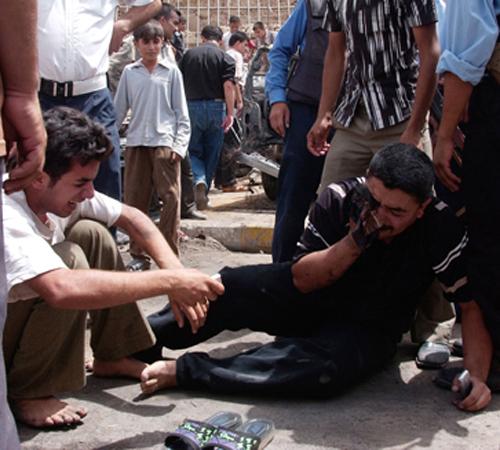More than 80 people die in triple bombing; Future bloodshed likely

July 17, 2007
BAGHDAD – A triple bombing, including a massive suicide truck blast, killed more than 80 people Monday in Kirkuk, the deadliest attack yet in the oil-rich northern city. The bloodshed reinforced concern that extremists are heading north as U.S.-led forces step up pressure around Baghdad.
The vast majority of the casualties came in the truck bombing, which blasted a 30-foot-deep crater and damaged part of the roof of the headquarters of the Patriotic Union of Kurdistan, the party of President Jalal Talabani. The explosion took place in a crowded commercial area and appeared aimed at causing as many civilian deaths as possible.
Saman Ahmed, 35, said he was driving along the street when the blast “pushed other vehicles toward my car along with fire and shrapnel like a flood.”
“The glass from my car and the other cars went into my face,” he said from his hospital bed. “Now I cannot hear well because of the sound of the explosion. I saw tens of dead bodies lying on the ground.”
Kirkuk, 180 miles north of Baghdad, is a center of tensions among Arabs, Turkomen and Kurds, who want to include the area in the autonomous Kurdish region of the north. Voters in the city are to decide whether to join the Kurdish self-ruled region in a referendum by year’s end.
Get The Daily Illini in your inbox!
With three ethnic groups competing for control, violence in Kirkuk has been frequent. But Monday’s blasts were on a far bigger scale than most attacks.
U.S. and Iraqi officials have said Sunni Arab insurgents are moving farther north to carry out attacks, fleeing U.S. offensives in and around Baghdad, including in the city of Baqouba, a stronghold of extremists on the capital’s northwestern doorstep.
Maj. Gen. Jamal Tahir, the Kirkuk police chief, said he believed that U.S.-led military operations around Baqouba pushed al-Qaida in Iraq’s elements to flee to the nearest cities.
“Some of them came to Kirkuk because they have loyalists here and they started to carry out terrorist acts,” he said.
After the truck bombing, rescuers scrambled through the smoke and the debris lifting bloodied and broken bodies onto stretchers. The force of the blast ripped clothing off some victims.
At least 10 shops were damaged, as was part of the fence at nearby Kirkuk Castle, a historic fortress that is one of the city’s most prominent landmarks. The street was strewn with blackened husks of two dozen cars.
The blast killed at least 80 people and wounded more than 183, according to police Brig. Burhan Tayeb Taha. At least 10 of the victims were incinerated inside a bus that was engulfed by a ball of fire.
Twenty minutes later, a car bomb exploded about 700 yards away in the Haseer outdoor market, frequented by Kurds, Tahir said. The market was largely empty after the first attack, and the explosion caused several injuries.
Hours later, a car bomb exploded in the Domiz region of southern Kirkuk, killing a police officer and wounding six other policemen, according to Tahir.
Monday’s explosions occurred just over a week after one of the Iraq conflict’s deadliest suicide attacks hit a Turkomen Shiite village about 50 miles south of Kirkuk, killing more than 160 people.
Associated Press reporter Yahya Barzanji contributed from Kirkuk






